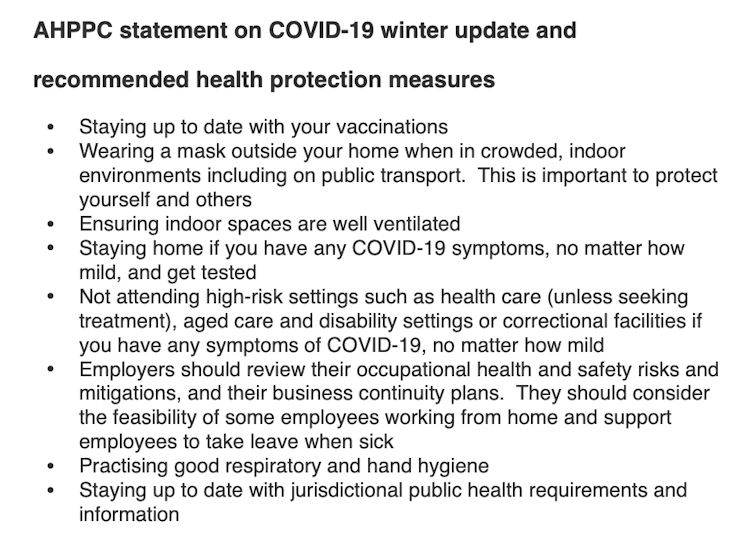Albanese needs to step up (and mask up) to help create a new mindset to meet the COVID crisis
- Written by Michelle Grattan, Professorial Fellow, University of Canberra

Anthony Albanese received his fourth COVID jab this week. A commendable example to the community, now that eligibility for the “winter shot” has been widened.
Well, commendable up to a point. Noticeably, neither Albanese nor the health worker wielding the needle was wearing a mask, and the prime minister quickly came in for some flak.
Masks are currently a front-line topic in the debate about how we deal with the new COVID wave that is seeing an average of 45 deaths a day, taking deaths this year alone north of 8,000.
Earlier this week Victoria’s acting chief health officer recommended mandating masks in a number of settings, only to be rebuffed by the state health minister, Mary-Anne Thomas. She said it “was not the most effective way to get the message out about the importance of mask wearing”.
Masks have been a political and ideological football throughout the pandemic.
Unlike in many other countries, pre-COVID you’d not see Australians masked up except in hospitals and the like, so we weren’t used to them.
In the early stages of the pandemic, before the way COVID is transmitted was clearly understood, there was vigorous dispute among health experts about their efficacy.
Later, the general population accepted them, with various degrees of willingness or reluctance.
Some people dislike masks because of their inconvenience. One gets that.
But, more peculiarly, for the political right masks have become a culture war rather than a matter of effectiveness. Stephen Reicher, professor of psychology at the University of St Andrews, writing in the Guardian, argues that some who hold a certain world view see masks as “a potent symbol of control: they are muzzles”. What these people reject “is less the mask and more the political and scientific establishment that proposes it”.
Given current public opinion, the mandating of mask wearing will stay limited. But in view of their place in the anti-COVID tool box, it would be helpful if politicians remembered to lead the way when appropriate.
We have reached a hinge point in the pandemic, and the weeks ahead present a huge challenge for political leaders. The community has moved on from COVID. But COVID has not moved on from the community. It has dug in.
A mind reset is needed. But that’s hampered by many in the public and in the political class being unwilling to accept that we haven’t “pushed through” to “live with COVID” in a safe sort of way. To the extent we are “living with COVID” we are accepting a crisis in the hospital system and a level of deaths that, if it had occurred in 2021, would have generated a massive reaction.
The earlier wisdom was that when the population was highly vaccinated, the situation would be under control. But it hasn’t worked out like that.
Vaccination is limiting the seriousness of the illness for most; it cuts deaths in relative terms.
But it hasn’t been successful against transmission, which means the virus is spreading like wildfire (currently hundreds of thousands have it). In absolute numbers, many people are getting quite sick, and there will be a good deal of “long COVID”.
The Albanese government has launched initiatives, including a campaign to urge boosters and action on anti-virals. But it’s like chasing a fleet-footed tiger.
And the government has refused to extend the emergency payment for workers forced to stay home, or the free RATs for concession card holders. It cites the budget. But we can imagine what Labor would be saying if it were still in opposition. There is some stirring within Labor ranks, with NSW Opposition Leader Chris Minns and federal backbencher Mike Freelander (a doctor) saying the emergency payment should be restored.
The new situation has caused havoc with what in 2020 was that (mostly) widely welcomed line from politicians that “we follow the expert advice”.
It’s been a roller coaster for the experts. Lauded and leaned on initially, they then ran into rougher times. They argued among themselves. They were dragged into the politics and demonised by critics who thought the politicians were listening too much to them.
Now we’re seeing the politicians grabbing back their agency, as the experience of the Victorian health official showed. More problematic, the politicians, including federal Health Minister Mark Butler, are making it clear the experts have to operate in the real world of where we’re up to with community opinion.
While this seems sensible at one level, things become complicated. When we get a piece of “expert” advice, do we assume it’s unadulterated, or a sort of shandy – containing a dash of “real world” lemonade?
There is also some counter-intuitive action at the “expert” level. With large numbers of deaths occurring in aged care homes, the NSW chief health officer, Kerry Chant, this week signed a public health order making it no longer mandatory for visitors to these facilities to be vaccinated. This is in line with the situation in Victoria and Queensland but the timing seemed odd.
It came as the Australian Health Protection Principal Committee (AHPPC), consisting of federal and state chief officers, last week reminded “individuals, employers and governments” of their shared responsibility to minimise the impact of COVID.
Authors: Michelle Grattan, Professorial Fellow, University of Canberra



















